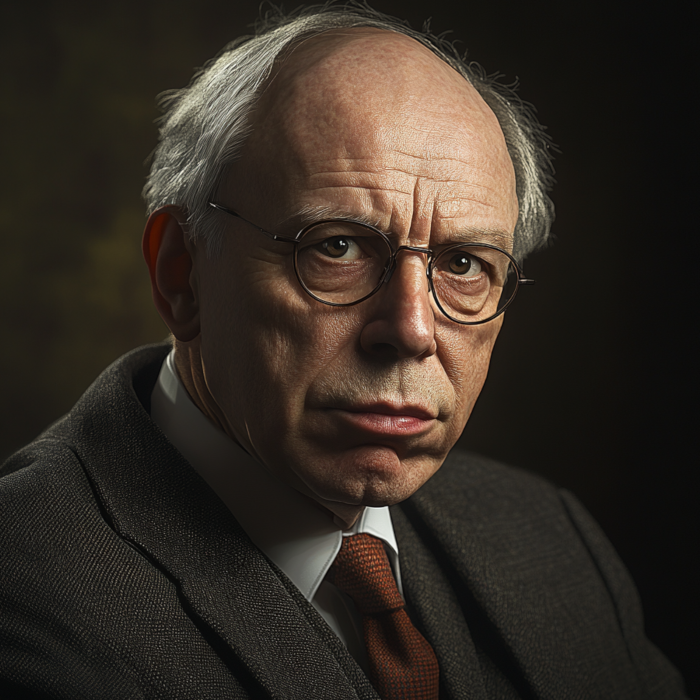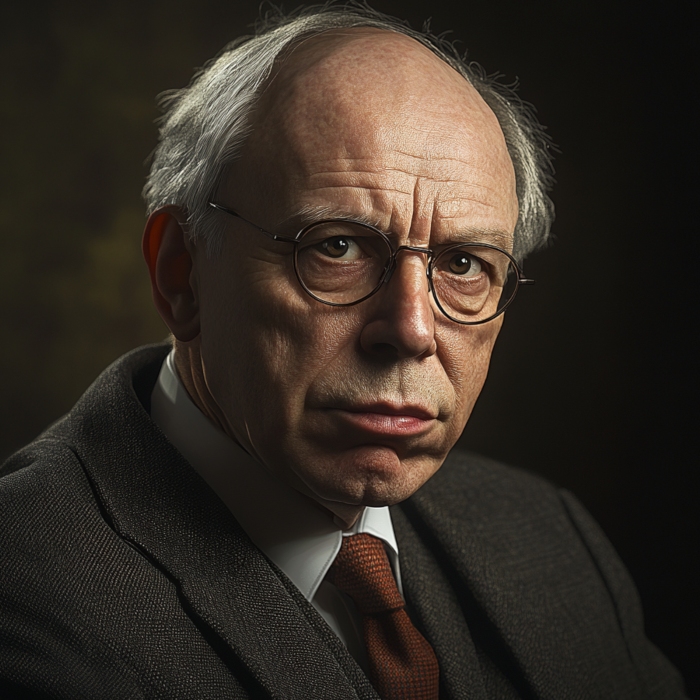


Andrei Sakharov (1921–1989) was a prominent Soviet physicist, dissident, and human rights activist who played a key role in the development of the Soviet Union’s hydrogen bomb and later became a vocal advocate for political reform, nuclear disarmament, and human rights. Sakharov's life was marked by a dramatic transformation from a leading figure in Soviet science to a powerful voice of moral conscience against the abuses of the Soviet government. He was awarded the Nobel Peace Prize in 1975 for his courageous defense of human rights and his opposition to the arms race.
Birth and Family Background: Andrei Dmitrievich Sakharov was born on May 21, 1921, in Moscow, Russia, to a family of intellectuals. His father, Dmitri Ivanovich Sakharov, was a physicist and teacher, and his mother, Yekaterina Alekseyevna, came from a noble family. Sakharov grew up in an intellectually stimulating environment and showed an early aptitude for science and mathematics.
Education and Early Work: Sakharov attended Moscow State University, where he studied physics, graduating in 1942. During World War II, he worked in various Soviet laboratories on military projects. After the war, Sakharov pursued advanced studies and, in 1947, earned his doctorate in physics.
Work on the Soviet Hydrogen Bomb: In 1948, Sakharov was recruited to join the Soviet nuclear weapons program under the leadership of physicist Igor Tamm. He was part of the top-secret team that developed the Soviet hydrogen bomb (also known as the thermonuclear bomb), a project driven by the Cold War nuclear arms race between the United States and the Soviet Union. His contributions to the development of this weapon earned him significant recognition and prestige within the Soviet scientific community. By 1953, the Soviet Union successfully tested its first hydrogen bomb, solidifying Sakharov’s status as one of the nation’s leading physicists.
Growing Concerns About Nuclear Weapons: Despite his involvement in the development of nuclear weapons, Sakharov grew increasingly concerned about the moral and environmental implications of nuclear testing and the arms race. In the late 1950s, he began to publicly advocate for the regulation of nuclear testing, recognizing the dangers of radioactive fallout. His efforts contributed to the 1963 Partial Test Ban Treaty, which prohibited atmospheric nuclear tests.
Shift to Political Activism: In the 1960s, Sakharov’s focus shifted from scientific work to broader political and ethical issues. He became an outspoken critic of the Soviet government's oppressive policies, particularly regarding censorship, human rights abuses, and the lack of political freedoms. His disillusionment with the Soviet regime intensified after witnessing the government’s suppression of dissent, including the persecution of writers, intellectuals, and political prisoners.
Progress, Coexistence, and Intellectual Freedom (1968): In 1968, Sakharov wrote an influential essay titled Progress, Coexistence, and Intellectual Freedom, in which he called for nuclear disarmament, peaceful coexistence between East and West, and the protection of human rights. He warned that the unchecked arms race could lead to nuclear catastrophe and argued that scientific and technological progress must be guided by ethical considerations. The essay was smuggled out of the Soviet Union and published internationally, garnering widespread attention. It marked Sakharov’s public break with the Soviet establishment and his emergence as a prominent dissident.
Persecution by Soviet Authorities: After the publication of his 1968 essay, Sakharov faced increasing persecution by Soviet authorities. He was dismissed from classified research projects and stripped of many privileges. However, his international reputation as a scientist and advocate for human rights protected him from harsher punishments, at least initially. Despite growing pressure, Sakharov continued to speak out against Soviet policies, particularly the treatment of political dissidents and prisoners of conscience.
Defense of Human Rights and the Nobel Peace Prize (1975): Sakharov became one of the Soviet Union’s most prominent human rights defenders, advocating for the release of political prisoners, freedom of expression, and the rule of law. His unwavering commitment to these causes earned him the Nobel Peace Prize in 1975. The Nobel Committee praised him for his "fearless personal commitment in upholding the fundamental principles for peace between men, and for courageous support of the human rights in his own country." Sakharov was unable to attend the ceremony in Oslo, as the Soviet government refused to allow him to leave the country. His wife, Yelena Bonner, accepted the prize on his behalf.
Exile to Gorky (1980–1986): In 1980, after Sakharov publicly condemned the Soviet invasion of Afghanistan, the government intensified its repression against him. He was stripped of his titles and awards and placed under internal exile in the city of Gorky (now Nizhny Novgorod), a city closed to foreigners. While in Gorky, Sakharov and his wife, Yelena Bonner, lived under constant surveillance, and his ability to communicate with the outside world was severely restricted. Despite these harsh conditions, Sakharov continued his activism, going on hunger strikes to protest the treatment of political prisoners and advocating for his wife’s right to travel abroad for medical treatment.
Release and Return to Public Life (1986): In 1986, during the period of glasnost (openness) and perestroika (restructuring) initiated by Soviet leader Mikhail Gorbachev, Sakharov was released from exile and allowed to return to Moscow. His return was widely seen as a symbol of the political changes taking place in the Soviet Union. Sakharov resumed his political activism, becoming a key figure in the pro-democracy movement that emerged in the late 1980s.
Involvement in Soviet Politics: After his release, Sakharov was elected to the Congress of People’s Deputies, the Soviet Union’s newly established legislature. As a member of this body, Sakharov continued to push for democratic reforms, human rights, and nuclear disarmament. He played an active role in the debates that shaped the final years of the Soviet Union, advocating for political freedoms and calling for the dismantling of the one-party system.
Moral and Intellectual Legacy: Andrei Sakharov remains a towering figure in the history of human rights and nuclear disarmament. His transformation from a leading nuclear physicist to a courageous dissident symbolized the moral responsibility of scientists and intellectuals to confront abuses of power. Sakharov’s advocacy for peaceful coexistence, freedom of speech, and the rights of individuals continues to inspire human rights movements worldwide.
Criticism of Soviet Repression: Sakharov’s outspoken criticism of the Soviet regime’s authoritarianism, censorship, and persecution of political dissenters made him one of the most respected figures in the global human rights movement. He was a key voice in exposing the darker aspects of the Soviet state, from the political repression of dissidents to the dangers of the nuclear arms race.
Contribution to Nuclear Disarmament: Sakharov’s work on nuclear disarmament was driven by his deep understanding of the catastrophic consequences of nuclear war. He believed that the arms race between the United States and the Soviet Union posed an existential threat to humanity, and he advocated for peaceful solutions to international conflicts. His vision of a world without nuclear weapons remains relevant in contemporary discussions about disarmament and global security.
Death in 1989: Andrei Sakharov died of a heart attack on December 14, 1989, in Moscow. His death came just as the Soviet Union was undergoing profound changes that would lead to its dissolution two years later. Sakharov’s passing was mourned by people around the world, and his legacy as a champion of human rights and peace endures.
Posthumous Honors: In post-Soviet Russia, Sakharov has been honored as a symbol of resistance to tyranny. Numerous streets, schools, and institutions have been named after him, both in Russia and abroad. The Sakharov Prize for Freedom of Thought, established by the European Parliament in 1988, is awarded annually to individuals or groups who have dedicated their lives to the defense of human rights and freedom of expression.
Andrei Sakharov’s life exemplifies the power of moral courage in the face of oppression. As a physicist, he contributed to one of the most significant scientific achievements of the 20th century, but he later dedicated his life to fighting for peace, justice, and human rights. Sakharov’s legacy as a dissident and defender of freedom remains a powerful example of the role that individuals can play in challenging authoritarian regimes and advocating for the dignity of all people. His vision of a world based on peace, human rights, and the responsible use of science continues to inspire activists, scientists, and leaders around the world.

We use cookies
We use cookies and other tracking technologies to improve your browsing experience on our website, to show you personalized content and targeted ads, to analyze our website traffic, and to understand where our visitors are coming from. Privacy Policy.